Ireland: How customs border posts 'cemented' partition 100 years ago
- Published
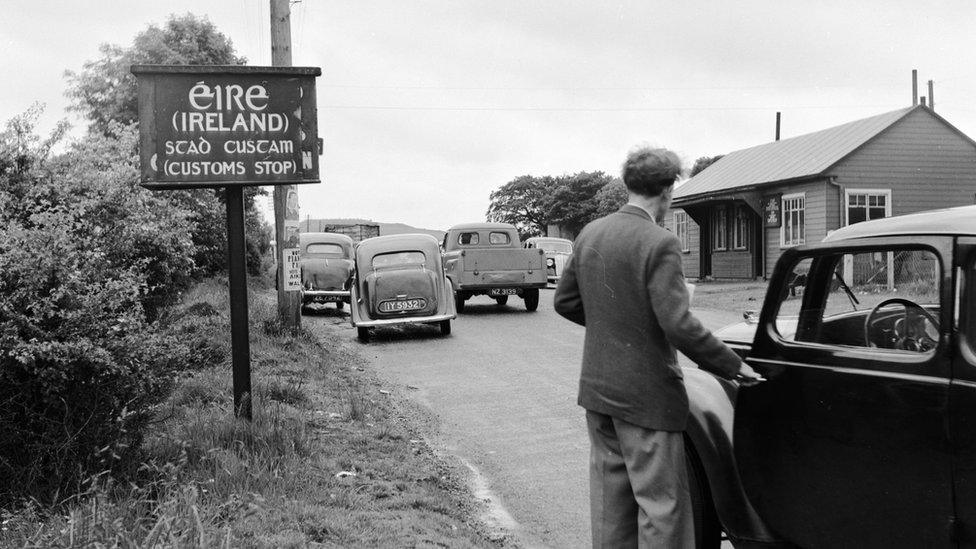
A motorist pictured at an Irish customs checkpoint circa 1950
Concerns over the possible return of a hard Irish border have rarely been out of the news since the Brexit vote.
From the Brexit backstop, to the Northern Ireland Protocol, to the current Windsor Framework, there has been much debate on how the UK should manage its only land border with the EU.
But it was exactly a century ago, on 1 April 1923, that the hard Irish border was born.
Almost two years after the partition of Ireland, customs barriers were built, halting the free movement of goods between Northern Ireland and what was then known as the Irish Free State.
It created delays at checkpoints, increased costs for consumers and cut off many communities from their biggest markets.
And it was not the UK government or leading unionists who were the driving force behind the customs posts - instead was the newly-independent Irish government.
Today, it is one of the biggest supporters of a frictionless border, but in 1923, Dublin saw the customs border as a temporary arrangement for financial and strategic gain.
However, that supposed temporary arrangement stayed in place for 70 years and was only removed when the UK and Ireland both joined the EU Single Market in 1993.
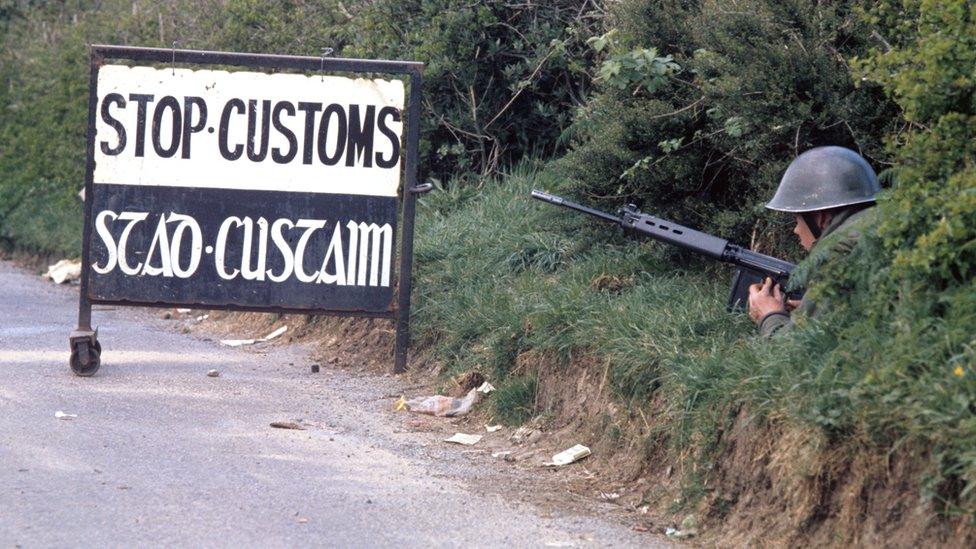
A soldier looking towards the Irish side of the Irish/UK customs border in 1974
So are there any relevant lessons for a Brexit-era generation?
"There are so many similarities between now and 100 years ago," said historian Cormac Moore.
"There were strong business objections from both sides of the border to trade barriers.
"They felt that this was going to have a negative impact on business, and they were right."
From the stroke of midnight on 1 April 1923, members of the public faced new customs duties and potential fines for moving certain goods over the 310-mile (500km) frontier.
Traders had to fill in extra paperwork and, whether you crossed the border on foot, by car or by train, customs officers could search you and your belongings for dutiable items.
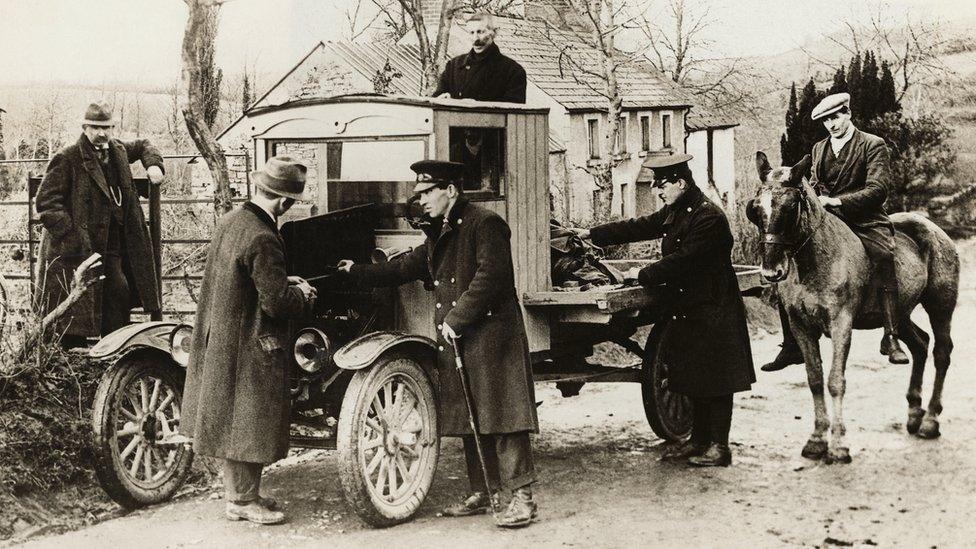
A truck returning from Northern Ireland is stopped at the border by Irish Free State customs officers (1925)
Businesses and communities in border regions immediately felt the impact.
"The first town that comes to mind when I think of the town most affected by the imposition of customs barriers is Clones, County Monaghan," Moore explained.
"Clones was a very thriving, successful market town. Its main hinterland was the whole Fermanagh countryside and almost overnight that was cut off.
"People who used to trade and do their shopping in Clones felt it was just too burdensome to have to stop for customs checks."
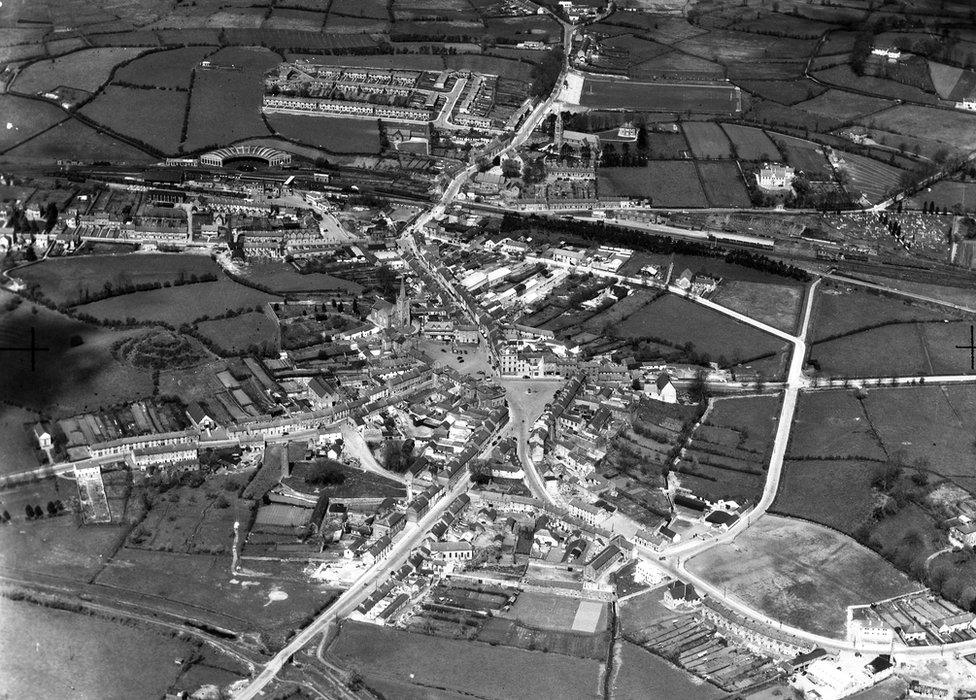
An aerial view of Clones town, close to the County Fermanagh border, circa 1952
He added: "They were unable to buy certain goods without paying duties on them, so they started shopping in Enniskillen or Newtownbutler.
"It was the same with Dundalk, cut off from Down and Armagh; Newry cut off from Louth."
Customs 'funded independence'
The British government had divided the island of Ireland almost two years earlier, bringing Northern Ireland into existence in May 1921.
Republican leaders in the south bitterly opposed partition and sought to undermine it in various ways, including through IRA incursions and a boycott of Belfast banks and businesses.
So why would the Irish government want to reinforce the disputed land border with barriers and checkpoints - a move that even leading unionists opposed at the time?
It was all about making money and taking control, according to Moore, a historian with Dublin City Council.
Collecting customs duties allowed Dublin's government to build up its exchequer - money it really needed at the tail end of an expensive civil war.
Moore also explained that the Free State viewed financial separation from the UK as "a key symbol of independence".
"If you have fiscal autonomy, you have to have control over your borders, you have to have control over customs."
In addition to filling its coffers, the Irish government hoped customs charges would damage Northern Ireland's fledging economy and bully unionists into a reunited Ireland.
"They thought they could force Northern Ireland into the Free State by loss of trade, it was so foolish," said Moore.
"Historically Northern Ireland was always more reliant on east-west trade than north-south trade."
He explained that Dublin's eventual aim was an all-Ireland customs zone, but that made no sense to Northern Ireland's then finance minster Hugh Pollock.
"If we must have some such [customs] barrier we would rather it would be with the south with its four million people than England with its 40 million," Mr Pollock said at the time.
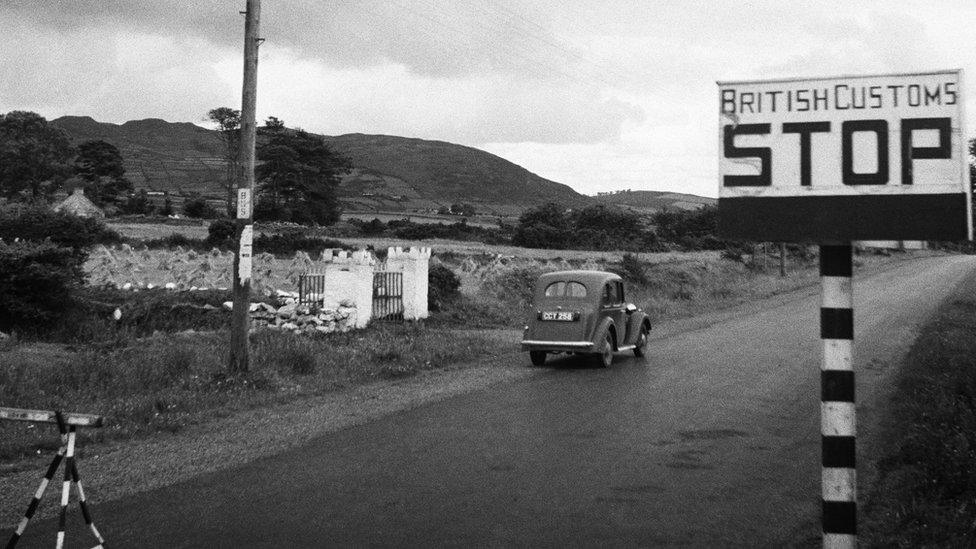
Checkpoints were set up each side of the border and people faced inspections at both (photo circa 1960)
Unionist leaders today, who oppose the current post-Brexit Irish Sea border, make similar points about the importance of unrestricted access to markets in Great Britain.
Back in 1923, higher costs imposed on north-south trade immediately forced Northern Ireland firms to divert sales to Great Britain, strengthening the union rather than undermining it.
In fact, Moore said, the customs border had "arguably the largest impact in driving division between north and south, in cementing partition".
April Fools and arson
The new rules were introduced on the first day of the financial year in 1923, but this also fell on Easter Sunday and April Fools' Day.
The dawn of the new regime was greeted very differently by unionist and nationalist newspapers.
"Today is literally the birthday of Ireland's fiscal freedom," declared the nationalist-leaning Freeman's Journal.
But the Belfast-based Northern Whig was scathing, warning the "foolish adventure" would lead to higher prices.
"All Fools' Day was celebrated in the Free State by the inauguration of the customs barrier which fiscally, is to cut off Southern Ireland from the rest of the world," it wrote.
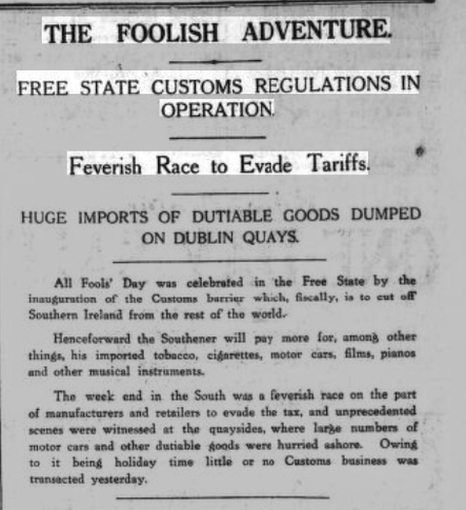
An extract from the Northern Whig newspaper dated 2 April 1923
It scoffed that the southern consumer would "pay more for, among other things, his imported tobacco, cigarettes, motor cars, films".
The Belfast News Letter reported a "desperate rush to get supplies over the frontier" in the days leading up to Easter.
The Derry Journal noted Dublin's quays were "congested by the abnormal consignments of cars rushed into the country in an attempt to get ahead of the tariff barrier".
Although the customs border as a whole lasted for seven decades, some checkpoints did not even survive the first seven days.
A customs hut at Emyvale, County Monaghan was burned during Easter Week and another outside Dundalk was "blown to smithereens by a large mine", according to the Frontier Sentinel.
Few republicans supported the Dublin government's customs strategy and customs posts were intermittently targeted by arson, gun attacks and bombings until the late 1990s.
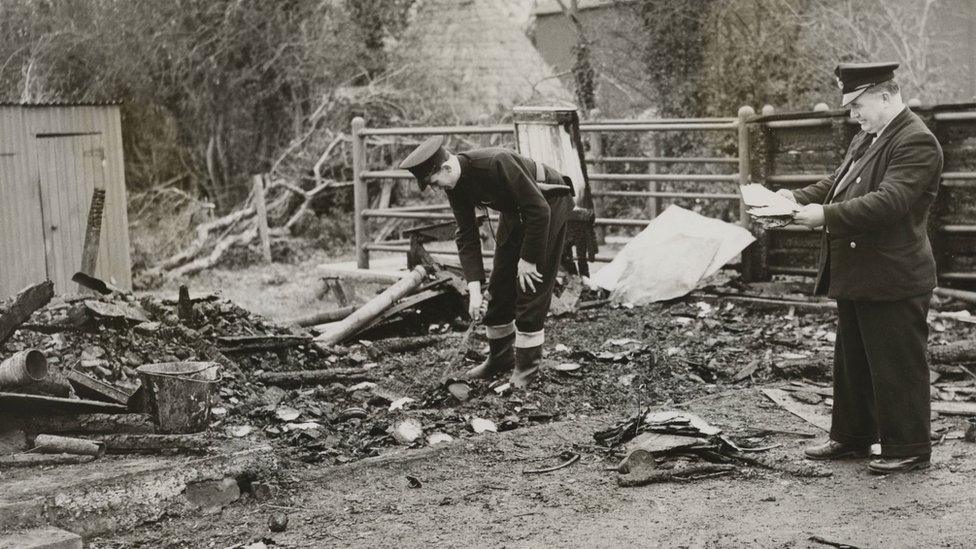
The aftermath of a 1956 bomb attack at a British customs post near the Armagh/Monaghan border
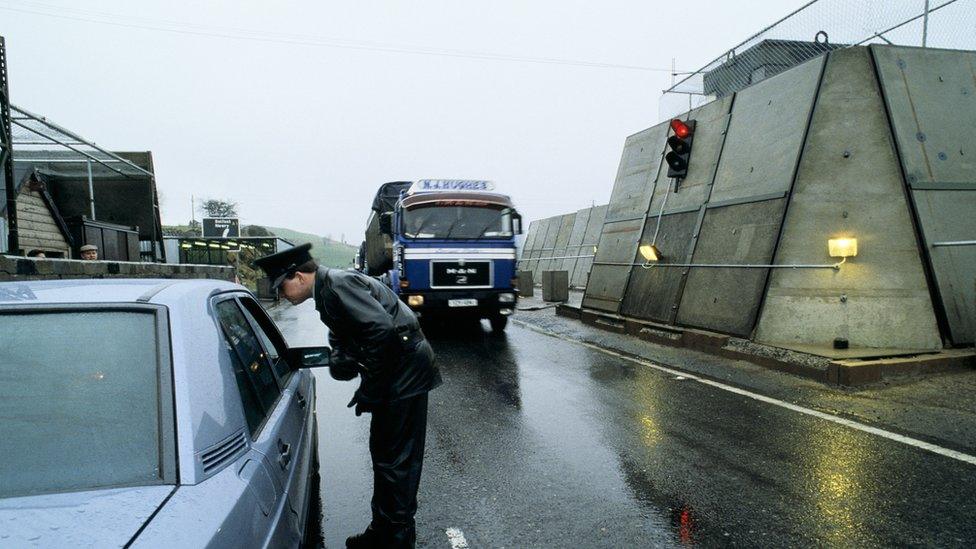
A security checkpoint near the border, pictured in March 1988
But border checks did not completely disappear with the introduction of the Single Market in 1993.
The Troubles were still raging violently and, by that stage, it had become more of a military stronghold than a customs zone.
"Most people's memories of the border in the 1970s and 80s would have been checkpoints, British Army personnel, watchtowers," said Cormac Moore.
"The border still remained intact until after the signing of the Good Friday Agreement later that decade and, then for 20 years, it's been pretty much frictionless."
Related topics
- Published6 December 2022
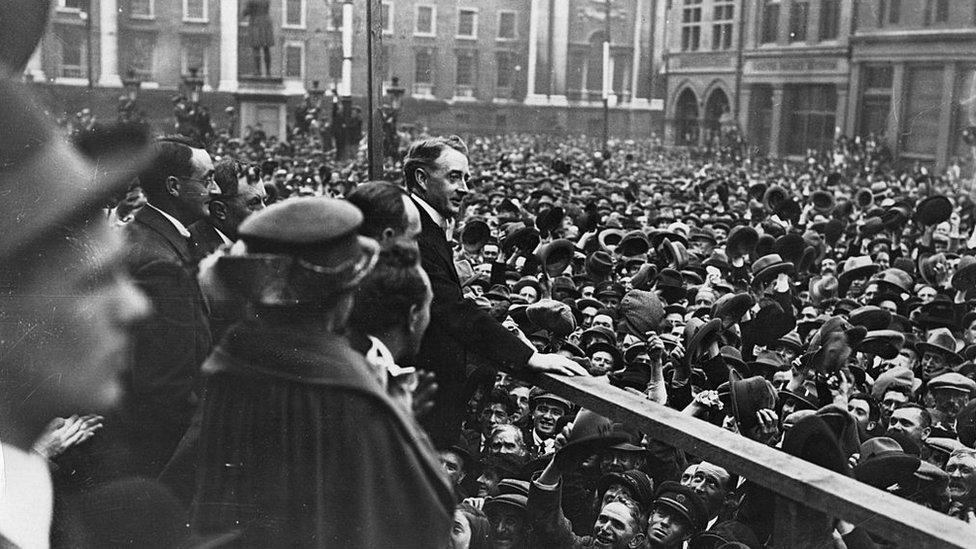
- Published3 May 2021
